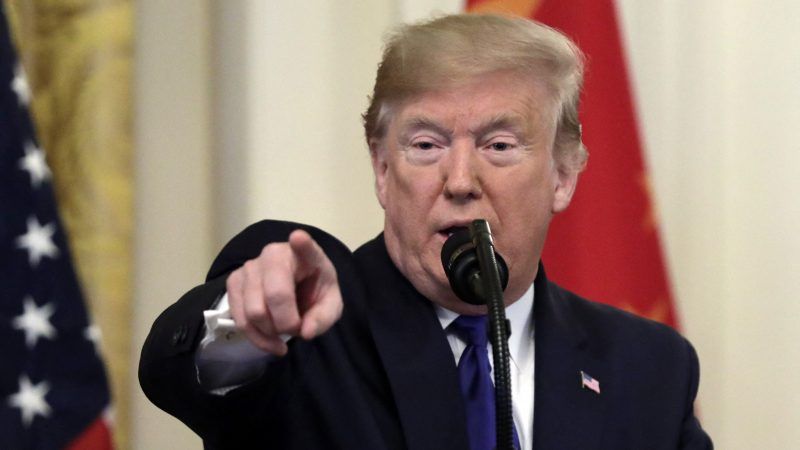By Withholding Funds to Ukraine, Trump Broke the Law
The Government Accountability Office says Trump's spending delay was illegal.

One argument that President Donald Trump's supporters have employed in the impeachment debate is that it was merely a "policy dispute." Yes, Trump held up aid to Ukraine last summer, this line goes, but he did so in pursuit of his agenda in the region.
There are several problems with this argument. One is that it has become increasingly clear that the president was pursuing a personal political agenda through his personal lawyer, not a national agenda through the formal diplomatic process. Another problem, arguably more serious, is that even if Trump was pursuing some less blatantly corrupt goal, what he did was still illegal.
That is the conclusion reached by the Government Accountability Office (GAO) in a sharply worded letter released this morning. The letter raises serious questions about whether the Trump administration violated the constitutional separation of powers.
By withholding aid to Ukraine, the letter says, the Trump administration violated the Impoundment Control Act of 1974, which governs the modern budget process and which specifically prohibits the executive branch from declining to spend money that Congress has authorized.
"The Constitution," the GAO letter says, "specifically vests Congress with the power of the purse, providing that 'No Money shall be drawn from the Treasury, but in Consequence of Appropriations made by Law.'"
In addition, the Constitution gives Congress—and only Congress—the power to make laws. So when Congress makes a law that governs the budget process, and then passes a law laying out what money is to be spent and how, the president is constitutionally obliged to spend that money in the ways that Congress has authorized.
In certain circumstances, the executive can delay such spending, but this typically requires a letter to Congress offering a justification for the proposed delay. The Trump administration provided no such notification or justification. Instead, the delays were buried in Office of Management and Budget (OMB) footnotes.
Asked to explain the funding delay, OMB, which handles spending for the executive branch, told GAO that Trump was making sure the money was not spent "in a manner that could conflict with the President's foreign policy."
The money was withheld, in other words, to pursue executive branch policy objectives. This is not a permissible reason to delay such spending under the relevant law. As the GAO letter states, "Faithful execution of the law does not permit the President to substitute his own policy priorities for those that Congress has enacted into law."
If this was a policy dispute, as Trump's defenders have argued, and if it was a matter of pursuing "the President's foreign policy," as the executive branch has claimed, it was illegal. So even if you buy the Trump administration's own explanation for the delay, the decision, which reports say was made shortly after the president finished a phone call with the Ukrainian president, was nevertheless against the law.
This is not some minor stretching of presidential power to be shrugged off. The notion that Congress and only Congress has the power of the pursue is a core constitutional concept, a fundamental aspect of the separation of powers. The president's job is to execute the law, not make it.
Nor is this a matter in which the legal particulars are in dispute. As Ilya Somin of George Mason Law School wrote last year in a prescient discussion of the constitutional questions raised by the delay, "If there is one thing that constitutional law scholars agree on, it is that the spending power is supposed to be controlled by Congress, not the president. Even most of those who otherwise favor very broad presidential power concur."
Federal officials were aware that they were likely breaking the law at the time. Emails made public by the Center for Public Integrity last year show that OMB and Defense Department employees were concerned that without a clear rationale for delaying the funds, the move would be illegal under the Impoundment Control Act. One OMB lawyer quit the job, not wanting to participate in a potentially illegal act.
Trump's political appointees dismissed these concerns both privately and publicly. In October 2019, OMB Director Mick Mulvaney noted that a report had suggested "that if we didn't pay out the money it would be illegal." This, he argued, was "one of those things that has a little shred of truth in it, that makes it look a lot worse than it really is." It's just a little presidential lawbreaking. How bad could it really be?
Mulvaney's casual attitude towards presidential lawbreaking offers more than a little insight into how the Trump administration thinks about its legal and constitutional obligations. And the GAO has now confirmed that OMB staffers were right to worry that the maneuver was illegal, even under the administration's after-the-fact rationale that it was intended to pursue a legitimate presidential policy agenda. The Trump administration broke the law, it and violated a core constitutional principle in the process. It's as bad as it looks.



Show Comments (603)